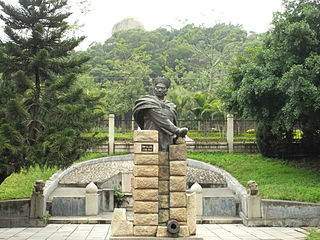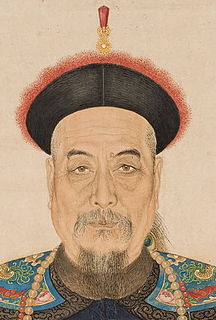 W
WChen Huancheng (1776–1842) was a 19th-century military leader of Qing China. He served as the provincial military leader in Jiangnan Province before being killed in the First Opium War.
 W
WDeng Tingzhen was a Chinese politician who served as the Governor-General of Liangguang from early 1836 until early 1840.
 W
WGe Yunfei was a Chinese general of the Qing dynasty. He served in the First Opium War and died during the British capture of Chusan.
 W
WGuan Tianpei was a Chinese admiral of the Qing dynasty who served in the First Opium War. His Chinese title was "Commander-in-Chief of Naval Forces". In 1838, he established courteous relations with British Rear-Admiral Frederick Maitland. Guan fought in the First Battle of Chuenpi (1839), the Second Battle of Chuenpi (1841), and the Battle of the Bogue (1841). The British account described his death in the Anunghoy forts during the Battle of the Bogue on 26 February 1841 as follows: Among these [Chinese officers], the most distinguished and lamented was poor old Admiral Kwan, whose death excited much sympathy throughout the force; he fell by a bayonet wound in his breast, as he was meeting his enemy at the gate of Anunghoy, yielding up his brave spirit willingly to a soldier's death, when his life could only be preserved with the certainty of degradation. He was altogether a fine specimen of a gallant soldier, unwilling to yield when summoned to surrender because to yield would imply treason.
 W
WHuang Juezi (1793 – 1853) was a Chinese Qing dynasty scholar and civil servant and a fervent opponent of the opium trade. His 1838 official memorial to the Daoguang Emperor detailing the problems caused by opium helped lead to the appointment of Lin Zexu as Imperial Commissioner responsible for tackling the opium problem, a move that would ultimately result in the First Opium War with Great Britain.
 W
WLin Zexu, courtesy name Yuanfu, was a Chinese head of states (Viceroy), Governor General, scholar-official under Emperor of the Qing dynasty best known for his role in the First Opium War of 1839–42. He was from Fuzhou, Fujian Province. Lin's forceful opposition to the opium trade was a primary catalyst for the First Opium War. He is praised for his constant position on the "moral high ground" in his fight, but he is also blamed for a rigid approach which failed to account for the domestic and international complexities of the problem. The Daoguang Emperor endorsed the hardline policies and anti-drugs movement advocated by Lin, but then blamed Lin for the resulting disastrous war.
 W
WRobert Thom was an English nineteenth century Chinese language translator and diplomat based in Canton who worked for the trading house Jardine, Matheson & Co. and was seconded to the British armed forces during the First Opium War (1839 – 1842). For his literary works Thom used Sloth as a nom de plume.